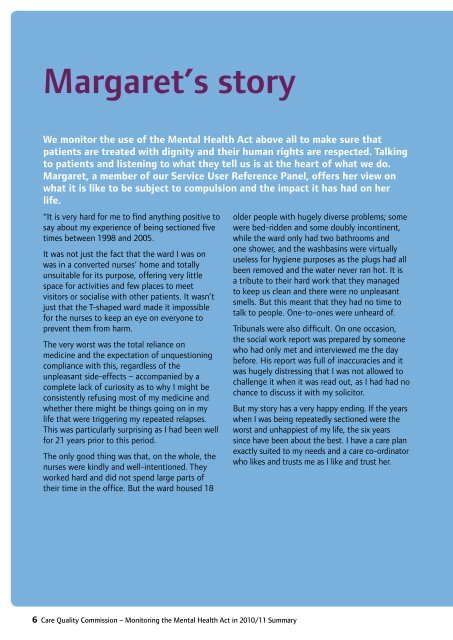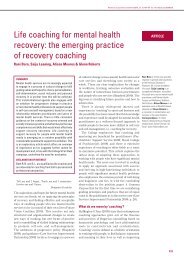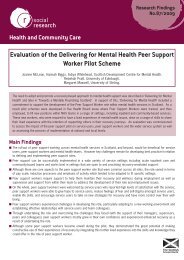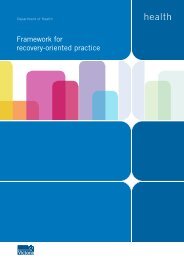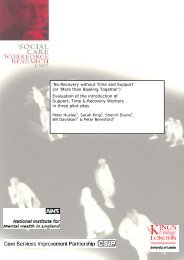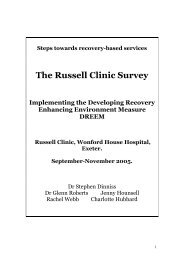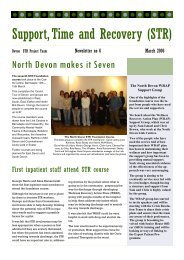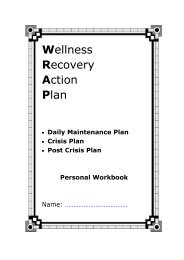Mental Health Act Annual Report 2010/11 - Care Quality Commission
Mental Health Act Annual Report 2010/11 - Care Quality Commission
Mental Health Act Annual Report 2010/11 - Care Quality Commission
You also want an ePaper? Increase the reach of your titles
YUMPU automatically turns print PDFs into web optimized ePapers that Google loves.
Margaret’s story<br />
We monitor the use of the <strong>Mental</strong> <strong>Health</strong> <strong>Act</strong> above all to make sure that<br />
patients are treated with dignity and their human rights are respected. Talking<br />
to patients and listening to what they tell us is at the heart of what we do.<br />
Margaret, a member of our Service User Reference Panel, offers her view on<br />
what it is like to be subject to compulsion and the impact it has had on her<br />
life.<br />
“It is very hard for me to find anything positive to<br />
say about my experience of being sectioned five<br />
times between 1998 and 2005.<br />
It was not just the fact that the ward I was on<br />
was in a converted nurses’ home and totally<br />
unsuitable for its purpose, offering very little<br />
space for activities and few places to meet<br />
visitors or socialise with other patients. It wasn’t<br />
just that the T-shaped ward made it impossible<br />
for the nurses to keep an eye on everyone to<br />
prevent them from harm.<br />
The very worst was the total reliance on<br />
medicine and the expectation of unquestioning<br />
compliance with this, regardless of the<br />
unpleasant side-effects – accompanied by a<br />
complete lack of curiosity as to why I might be<br />
consistently refusing most of my medicine and<br />
whether there might be things going on in my<br />
life that were triggering my repeated relapses.<br />
This was particularly surprising as I had been well<br />
for 21 years prior to this period.<br />
The only good thing was that, on the whole, the<br />
nurses were kindly and well-intentioned. They<br />
worked hard and did not spend large parts of<br />
their time in the office. But the ward housed 18<br />
older people with hugely diverse problems; some<br />
were bed-ridden and some doubly incontinent,<br />
while the ward only had two bathrooms and<br />
one shower, and the washbasins were virtually<br />
useless for hygiene purposes as the plugs had all<br />
been removed and the water never ran hot. It is<br />
a tribute to their hard work that they managed<br />
to keep us clean and there were no unpleasant<br />
smells. But this meant that they had no time to<br />
talk to people. One-to-ones were unheard of.<br />
Tribunals were also difficult. On one occasion,<br />
the social work report was prepared by someone<br />
who had only met and interviewed me the day<br />
before. His report was full of inaccuracies and it<br />
was hugely distressing that I was not allowed to<br />
challenge it when it was read out, as I had had no<br />
chance to discuss it with my solicitor.<br />
But my story has a very happy ending. If the years<br />
when I was being repeatedly sectioned were the<br />
worst and unhappiest of my life, the six years<br />
since have been about the best. I have a care plan<br />
exactly suited to my needs and a care co-ordinator<br />
who likes and trusts me as I like and trust her.<br />
6 <strong>Care</strong> <strong>Quality</strong> <strong>Commission</strong> – Monitoring the <strong>Mental</strong> <strong>Health</strong> <strong>Act</strong> in <strong>2010</strong>/<strong>11</strong> Summary


